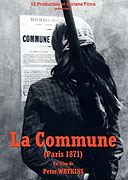
Rendező:
Peter WatkinsSzereplők:
Gérard Watkins, Aurélia Petit, Joachim Gatti, Laurent Roth, Philippe Welsh, Gaston Lepage, Jürgen EllinghausRecenziók (3)
In its uncut version, Peter Watkins’s magnum opus lasts almost six hours, but I was never bored for even a minute. The English director reconstructs the brief, brutally suppressed Paris Commune government in the form of a sequence of television and radio reports directly from the scene (in the film Culloden, he similarly demonstrated what the Jacobite uprising might have looked like if television cameras had existed at that time). He proceeds on the basis of thoroughly researched historical sources, from which he also quotes extensively in the intertitles. This would have been a unique work thanks only to the (non-)actors committed to their roles (for example, members of the bourgeoisie are played by conservative party voters so that their contempt for the rebels is more authentic) and the long, fragmented shots that capture the chaos of the times while also being highly organised, but Watkins did not remain at the pseudo-documentary level. In the spirit of the Theatre of the Oppressed, the (non-)actors sometimes break the fourth wall and comment on the staged events from the perspective of their own time (1999), or rather reflect on how older and newer media contribute to the formulation of reality and the unequal distribution of power based on class and gender. The film thus also conveys communal ideas by constantly drawing attention to the fact that it is itself the work of a group of like-minded people who are striving for economic and social changes. At the same time, it is far more dynamic and less self-centred than, for example, Godard’s deconstructionist film essays of the 1960s and 1970s. Although the set is minimalist (the entire shoot took place over the course of two weeks in an abandoned factory on the outskirts of Paris), at the end I had the feeling that I had a relatively good grasp of the period and the problems that the Parisian working class was facing at the time, and I also understood why comprehending them is relevant for the present. I imagine that in an ideal world, students would leave every history lesson with the same feelings. 90%
()
The screening of La Commune happened to come just a few days after I finished reading Sinclair's "Kerosene", the second half of which consists almost entirely of a repetitive lamentation of how unfairly and corruptly the labor movement in the US was treated in the early 20th century. So, by the time I'd sat through nearly six hours of Watkinson's pamphlet fretting over the fate of the Paris Commune, its neglect in French memory, persistent class inequalities, cultural globalization, patriarchy, ketchup that won't come out of the bottle, and so much else, I was already feeling a bit of revolutionary fatigue. Nor am I enthusiastic about the way he has the actors analyze their one-dimensional figures, whom he leads quite obviously to where he wants them to be in order to confirm his own worldview. I like its anger at the whole world and I like the LARP with the documentary crew he created with a bunch of loyalists; and then there’s the running time, which is surprisingly reasonable. But it's just a scream of anger that just has unexpected force.
()
Long live the commune! They wanted to shoot it against the wall, but they did not know that its ideas had long surpassed all the walls that bullets endlessly shatter and the horizons of all bourgeois lackeys. The commune did not die, it has been alive for 150 years and will live until true freedom redeems it for everyone. A film that thinks for itself throughout its creation, with the aim of transferring the meaning of the narrative into the very process of giving testimony, can only be a worthy successor to the revolution that included everyone, from the working class to women and people of all races, long before the (supposedly liberal) capitalist elites began preaching about it today in a necessarily and significantly neutered form. It was a process that was too short: 72 days/6 hours, and yet it is too long: the entire history thereafter. Film can rewrite the past through the prism of the present, but can it transform itself in the present through the prism of the future it invents as it goes along if it truly becomes inspired by the commune, i.e., by connecting people and not just connecting the script with filming, budget money with production, and the producer's desires with monetizable traceability? A similar method of radical self-reflection during filming was applied, for example, by the Dziga Vertov group around Godard in the late 1960s and early 1970s, i.e., at a time when barricades last rose in Paris.
()